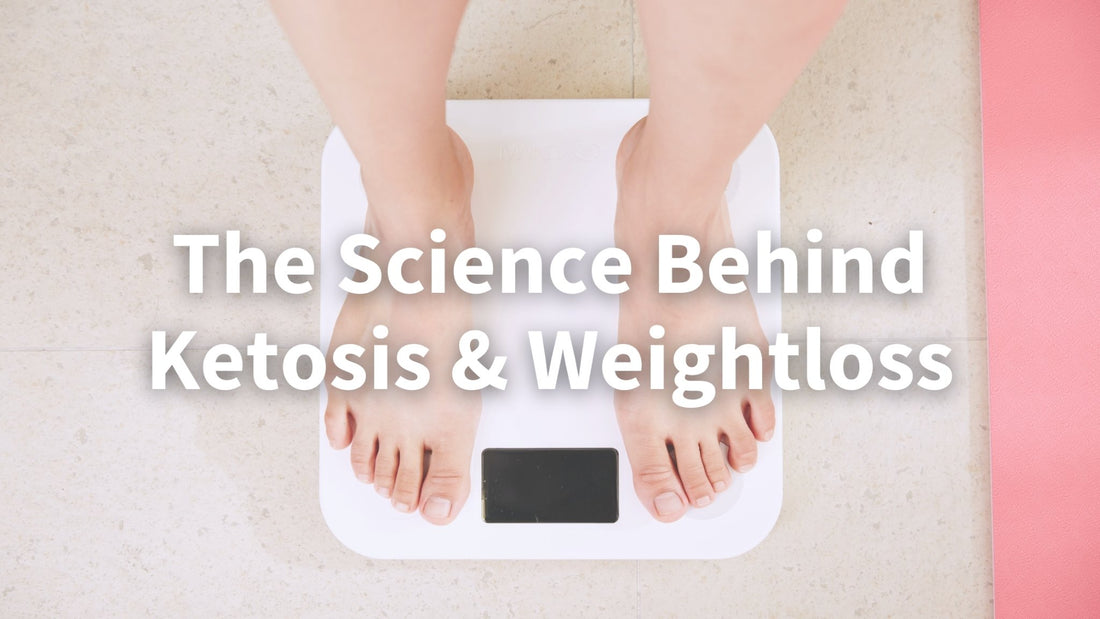
The Science Behind Ketosis - Why It Works For Weight Loss
Gloria PalcichShare
Being in a state of ketosis is a popular way of losing weight and achieving various health benefits. But what exactly is it, and why does it work? This blog post explores the science behind ketosis – its effects on the body, and how it helps with weightloss.
By understanding the biology behind it, you can make an informed decision about whether it is right for you. So, let’s take a closer look at ketosis…
What is ketosis?
Nutritional ketosis is a natural metabolic state in which your body switches from running on glucose (sugar) to running on ketones. When you are in ketosis, your body is using fat for energy, instead of carbohydrates.
This means that instead of breaking down carbohydrates into glucose and then using that glucose for energy, your body is breaking down stored fat into ketones and using those ketones for fuel. [1]
How does keto help with weightloss?
When your body is in ketosis, the liver produces ketones. Ketones are by products of fat breakdown that can be used for energy.
They’re a more efficient source of energy than glucose because they produce more ATP (adenosine triphosphate) per molecule than glucose. ATP is the energy that powers all cell activity. This means, when you’re in ketosis, you have more energy available to power your cells.
This extra ATP made available through ketosis can help you burn more calories and lose weight.
In other words, since the body isn't using glucose for fuel anymore, it will rely on stored fat to break it down into ketone bodies and use it as energy. Combined with the right food intake it helps the body loose excess fat. [1]
To sum up, the state of ketosis makes you loose weight by burning stored fat for energy.
How to get into ketosis and what to eat while you're there?
To enter ketosis, you need to consume a high-fat, low-carbohydrate diet. Once you're in ketosis, you need to continue to eat a high-fat, low-carb diet to maintain it. You must steer clear of processed foods, sugary drinks, and starchy vegetables.
Rather your keto diet must include plenty of leafy greens, non-starchy vegetables, meat, fish, eggs, and full-fat dairy products.
You must also drink plenty of water and consume electrolytes like sodium and potassium to prevent side any potential negative effects such as headaches and fatigue.
Tips for sustaining weight loss on a keto diet
Below are some tips for sustaining weight loss while following a ketogenic diet:
Intermittent fasting: This means eating all of your meals within a shorter window of time, for example, eight hours. Intermittent fasting can help to increase ketone levels and maintain them throughout the day. There are many different ways to do intermittent fasting, so find one that works for you and stick with it.
Eat adequate protein: In addition to maintaining a calorie deficit, it's also important to eat enough protein. Protein helps to keep you full and provides your body with the building blocks it needs to function properly. Aim to eat 0.8-1 gram of protein per pound of body weight per day. [2]
Quality sources of protein include eggs, chicken, fish, pork, beef, and legumes. You can also supplement with a high-quality protein powder if needed.
Stay physically active: Exercise can help to boost your weight loss results on a ketogenic diet. Exercise helps to increase your metabolism and burn more calories. It also has other benefits like improving your mood, increasing muscle mass, and reducing stress levels.
For best results, aim for 30-60 minutes of moderate exercise most days of the week. Examples include walking, jogging, biking, swimming, and strength training. [3]
Bottomline
So, there you have it. When your body is in ketosis, it breaks down stored fat into ketones to use as energy.
This state of ketosis can be achieved by following a high-fat, low-carbohydrate diet and/or intermittent fasting. Combined with the right food intake, ketosis helps the body loose excess fat.
If you are struggling to figure out what to eat on keto, you can check out our collection of keto meals. Or if you are seeking for guidance to achieve your weight loss goals you can speak to our nutrition expert and discuss a plan to achieve your goal.
References
- https://www.nature.com/articles/ejcn2013116
- https://academic.oup.com/ajcn/article/105/3/714-722/4569695
- https://www.cdc.gov/physicalactivity/basics/adults/index.htm
